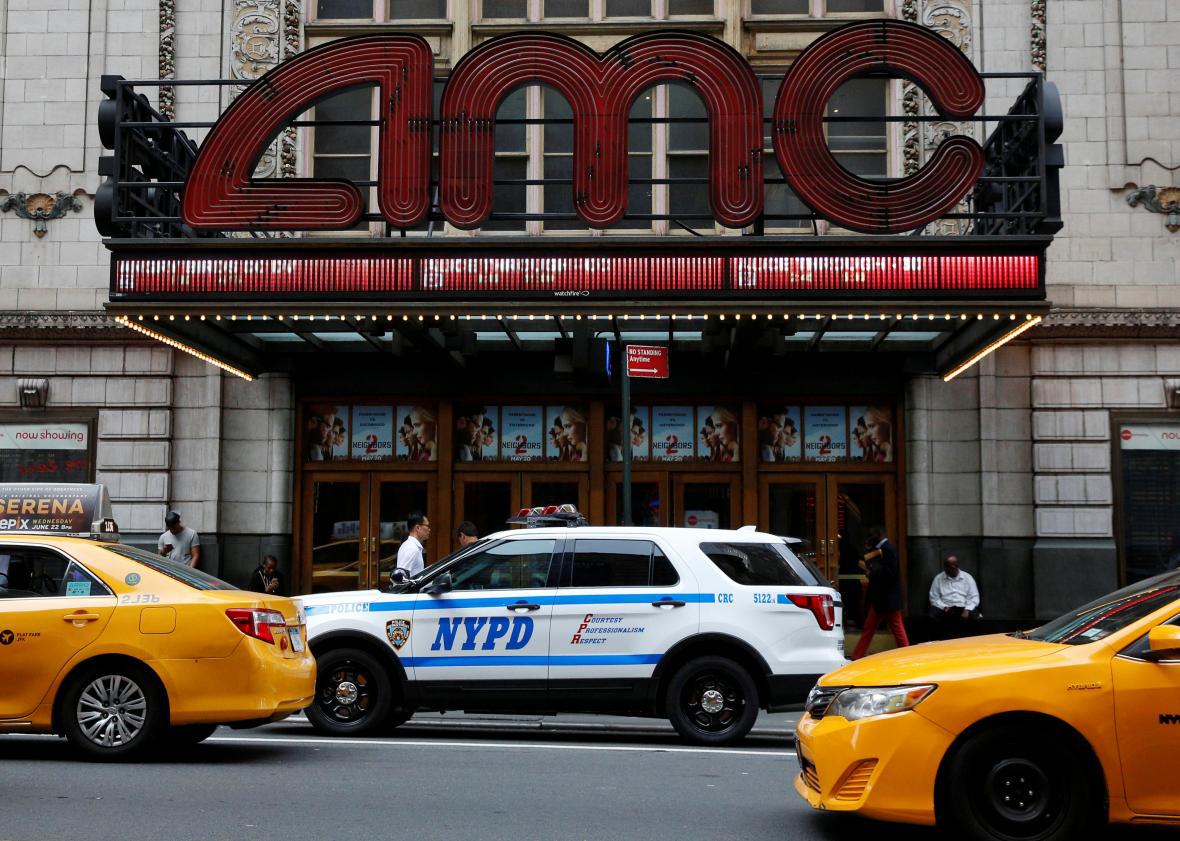Thanks to streaming services like Netflix and Spotify, Americans have gotten used to thinking about home entertainment as a $10-per-month, all-you-can-binge buffet. Now, a company run by one of Netflix’s co-founders wants to bring a similar model to movie theaters—which are decidedly unhappy about it.
This week, the 6-year-old startup MoviePass announced that it was dropping the cost of its ticket subscription service to $9.95 a month. For a little more than the price of a large popcorn, users will (theoretically) be allowed to catch one flick every day at any theater in the country that accepts Mastercard. (According to the company’s website, that covers 91 percent of theaters nationwide). However, the announcement drew a quick rebuke from AMC, the country’s biggest cinema chain, which said in a statement that it was conferring with lawyers about whether it could block customers from using MoviePass at its theaters.
It’s unclear whether AMC can do such a thing. Then again, it might not need to, since MoviePass seems to be counting on AMC’s long-term cooperation to survive.
At the moment, MoviePass is poised to burn a prodigious pile of cash subsidizing the cost of its subscriptions. That’s because every time a customer buys their movie ticket using one of the company’s debit cards, it pays the theater for the full cost of admission. Given that the average film ticket cost $8.65 last year, MoviePass will end up losing money on every user who sees two or more showings a month. In big markets like New York, where catching the latest Avengers installment can easily cost $15, they’ll come out behind on users who see just one movie a month.
This is not promising arithmetic. But CEO Mitch Lowe, the Netflix co-founder and Redbox executive who took the reins at MoviePass last year, thinks he has a vision to make his low, low price point work. He argues that his company’s service gives theaters a big boost to ticket and concession sales, and eventually, theaters will feel compelled to hand MoviePass a slice of the extra profits, or maybe pay them back via advertising.
“There must be some way to make us whole,” Lowe told Variety. “We know we have to prove the value we deliver and, at that point in time, where we’re delivering value to studios and theaters, we can work together with them in a constructive manner so that everybody makes more money.”
That might not be quite as crazy as it sounds. U.S. movie ticket sales have been stagnant for about a decade now, as Americans have come to prefer Netflixing and chilling to sipping $6 Sierra Mists in an air-conditioned cavern full of strangers. At the same time, ticket prices have continually hit record highs, thus chagrining regular filmgoers, along with anybody who has ever suffered the indignity of paying out the nose to see a mediocre summer blockbuster. And while box office totals have edged up slightly over that time, they’ve failed to keep pace with inflation since 2009. In the era of unlimited TV and tunes, trying to lure Americans to go back to the cinema by cutting prices conceivably seems worth a try.
But it’s also easy to guess why a company like AMC would recoil at Lowe’s plan. In its statement, the chain argued that MoviePass’ pricing was economically unsustainable, and “only sets up consumers for ultimate disappointment down the road if or when the product can no longer be fulfilled.” That’s probably a valid concern. But more broadly, AMC can’t be happy about the idea of a digital middle-man inserting itself into its industry, ultimately angling for a cut of the profits from each moviegoer even as it puts downward pressure on the price of an individual ticket. (AMC and MoviePass actually launched a pilot program together a few years ago when the startup’s subscription prices were much higher, but the relationship has clearly soured.)
The sort of odd thing about MoviePass is that it’s trying to become a middle man without asking permission first—or securing any payment for its services. Online ticketers like Fandango strike deals with theaters for the right to sell their seats, then market their service to the public. MoviePass is going to the public first, and hoping to gin up so much business that theaters will eventually strike a deal. The reason it can go that route is that its product is essentially just an app with movie times and a subscription debit card that customers can use to charge tickets to the company’s account. Lowe argued to Bloomberg that for AMC to block his service from their theaters, they’d have to start declining Mastercard. Still, he’s not going to make any money until he wins them over.
And if he can’t? It’s possible MoviePass could find other paths to profit. Eventually, it wants to use data on its users’ moviegoing habits to sell targeted advertising. (How lucrative that could really be seems like an open question.) Or, it’s possible that at $9.95, hordes of would-be film buffs will sign up for the service, then fail to see a movie each month. Milking money from subscribers who don’t actually use the service was the company’s original plan back when it was founded in 2011 and charged $30 a month, Bloomberg notes. But becoming the AOL of movie tickets doesn’t seem like a recipe for long-term success.
It’s a rather daring plan, all in all, made slightly less daring by the fact that MoviePass has already offloaded some of the risk: It sold a majority stake to a data-analytics firm on Tuesday to finance the scheme. If it succeeds, Lowe will have pulled off the impressive feat of fixing theaters’ business model against their will. If it crashes and burns, at least savvy moviegoers will get a few cheap flicks out of the deal.
